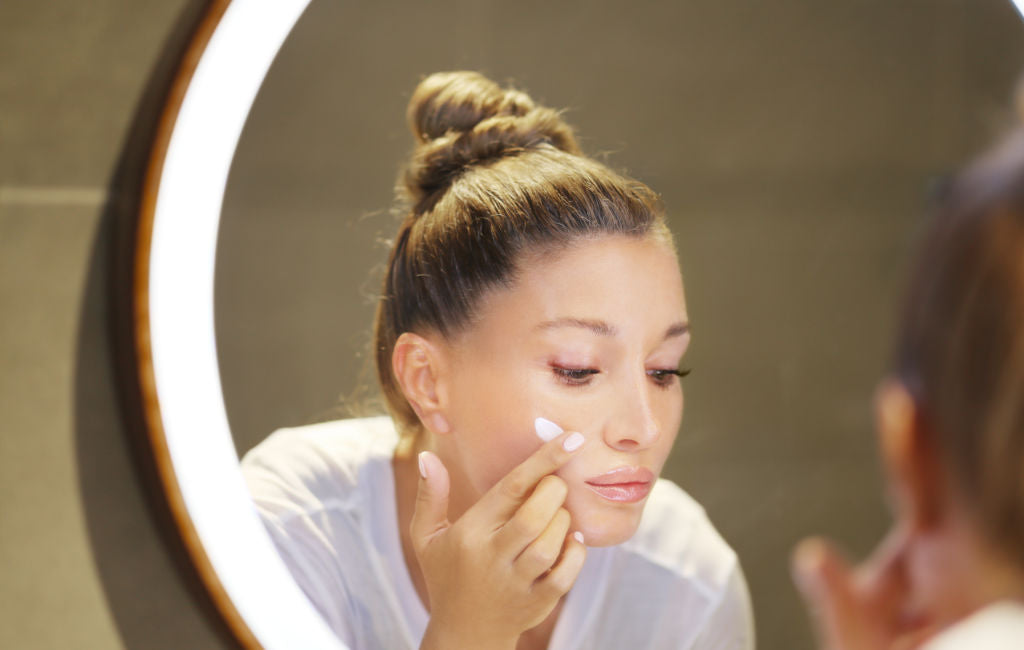
During the day, your skin acts as a barrier to the planet’s airborne contaminants, like bacteria, fungi, and even the sun’s harmful rays. The epidermis (the part of the skin you see) is a waterproof layer that can shed an average of about 500 million dead skin cells a day.
The outermost layer of the epidermis is our first line of defense, yet most of us notice our skin looks and feels different at night. That’s partly because your skin is trying to balance itself against impurities throughout the day, maintaining a consistent pH level and keeping the outer layer well-oiled.
To that end, washing your skin at the end of each day is essential to keeping it clear and healthy. To help you identify the night time skincare routine order that best complements your schedule and skin type, we’ve built this comprehensive guide.
Healthy skin care is just as much a process as it is a journey. Lean into this, as our skin complexion is part of what makes us unique.
Ready to turn your bedtime wind-down into skincare zen? Wonderful. Just keep reading.
Addressing Different Skin Types
Because there are different skin types, there’s no one-size-fits-all nighttime skincare routine. Instead, skincare routines may require trial and error using different techniques, products and regimens until you strike the perfect balance.
That being said, your skin type should guide your initial skincare decisions. There are five major skin types:
- Normal skin – Features include small pores that aren’t easily visible; the skin isn’t typically oily or dry and blemishes are rare.
- Dry skin – Pores are small and the skin is tight, especially after using a harsh product (e.g., alcohols, astringents, etc.)
- Oily skin – Pores are large and clearly visible, and sebaceous glands are overactive. Humidity and sweating exacerbate oil production.
- Combination skin – This type has both oily and dry areas. The T-zone (forehead, nose and chin) is usually oily, while the cheeks are normal to dry.
- Sensitive skin – Easily inflamed, and breakouts can occur from allergens you consume or that are absorbed through your skin
If you’re not sure which skin type you have, you’ll likely want to introduce new elements to your skincare routine in a slow, methodical manner. With this information in mind, it’s time to craft a night skincare routine order that suits you best.
Night Skincare Routine Steps
When it comes to the physical steps of your nighttime skincare routine, your skin type won’t necessarily affect the order of events. The products you use, however, need to be curated based on your complexion and sensitivity.
#1 Remove makeup and cleanse.
- Makeup-remover lotions are recommended for dry or sensitive skin because of their thick and creamy formulas. The gentle cleanser gently removes impurities while leaving the your clean skin soft and supple.
- Foaming cleansers are usually light and thin, and they’re suitable for oily, combination or sensitive skin.
- Gel-based cleansers are good for all skin types, as they’re light and leave your skin feeling fresh and hydrated.
- Cream-based makeup removers are ideal for people with dry, flaky skin. They’re usually thick and creamy with a silky texture.
- Micellar water makeup remover is great for all skin types. The cleansing formula is so light and thin that you don’t have to rinse it off.
#2 Tone with a moisturizing toner.
- Normal to dry skin types – Look for a calming, hydrating toner that leaves your skin smooth. If your face feels tight after a toner, try another brand.
- Oily skin types – Look for toners with hydroxy acids and natural astringents. These wipe away excess oil while moisturizing.
- Combination and sensitive skin types – Opt for toners with no fragrances or harsh chemicals (like sodium laureth sulfate), which can cause flare-ups, inflammation and excess dryness or oiliness.
#3 Spot-cleanse with targeted treatments or serums.
- Normal to dry skin – Use an ultra-hydrating serum to renew your skin barrier’s natural moisture and combat dryness.
- Oily skin – Banish dark spots and blemishes with natural, non-comedogenic products. Try out small amounts at first to see which works best for you.
- Combination or sensitive skin – Whether you have dry or oily skin, use fragrance-free products containing natural ingredients.
#4 Moisturize using a hydrating lotion, night cream or gel.
- Normal to dry skin types should opt for thick, CBD face cream-based moisturizers. Recommended ingredients for this skin type include honey, oatmeal and coconut oil.
- Oilyskin types need oil-free moisturizers or water-based products. Lotions with oatmeal or at least 10% aloe work best. Make sure they do not contain alcohol or an irritating active ingredient.
- Combination and sensitive skin types should use fragrance-free formulas. Depending on how dry and oily your face is, use two different moisturizers — one that’s rich and hydrating for dry areas, and one that’s light and non-greasy for oily areas.
#5 Mask only if you need to repair or deeply moisturize your skin.
- People with dry skin should look for masks with honey, prickly pear, coconut water and Vitamin B-3.
- Those with oily skin should try masks with antibacterial ingredients, such as grapefruit, charcoal and clay. Appleseed and cucumber are more soothing options if you’re sensitive to Vitamin C or your skin dries out easily.
- People who have combination or sensitive skin should opt for fragrance-free masks with natural ingredients such as oatmeal, aloe, fruit enzymes or honey.
Note: Leaving a mask on for too long or using masks too frequently can upset your skin’s natural pH. If you’re not particularly dry or oily, skip this step.
Now that we’ve outlined a general night skincare routine, it’s paramount that you practice trial and error. You might find that reorganizing the order or introducing different products suits your skin best. Healthy skin care is just as much a process as it is a journey. Lean into this, as our skin complexion is part of what makes us unique.
While you may have tried many of the above skincare product options, there’s one you may not have considered — CBD.
Take Extra Care of Your Skin With CBD
CBD is a cannabinoid derived from the hemp plant. As we gain a deeper understanding of how CBD interacts with our ECS (endocannabinoid system), all signs point to this compound being a gentle supplement that goes hand-in-hand with skin care.
To that end, CBD might help you:
- promote healthier skin.
- combat signs of aging.
- give your skin that sought-after glow.
- boost your energy and mood.
- reduce everyday blemishes.
When it comes to our skin, part of CBD’s efficacy is due to the terpenes that accompany the cannabinoid in full-spectrum CBD products. Terpenes are compounds that emit a specific aroma and taste, and they’re found in many plants, fruits and vegetables.
Best Terpenes For Nighttime
CBD and terpenes play different roles in how they affect your skin. At night, you’ll want to look for CBD with calming, tension-relieving terpenes like the following:
- Bisabolol is commonly found in chamomile, and renowned for its soothing, antimicrobial and antioxidant properties. It’s also frequently combined with essential oils or other terpenes because it aids the skin barrier in absorption, and it smells floral and sweet.
- β-myrcene is found in hops, mango, eucalyptus, bay leaves and lemongrass, and it has an herbal, rooty, spicy and balsamic aroma. This terpene is known to relieve tension and ease discomfort, and what makes it even better for bedtime is its sedating effects.
- Linalool can be found in lavender, citrus, mint, birch bark and cinnamon, and it has a floral, citrusy and spicy profile. This terpene is calming and has relaxing, sedating effects (plus it’s antimicrobial and antifungal for skin health). If you’re looking to unwind after a long day, linalool is the perfect lullaby.
- Geraniol is found in geraniums, peaches, raspberries, plums and — most abundantly — roses. It helps the skin to absorb other terpenes and skincare ingredients. Geraniol has antimicrobial and insect-repellent properties, and it’s perfect for relaxation due to its sedating effects.
- Eucalyptol has a sharp, minty smell, and can be found in eucalyptus and the tea tree. It’s uplifting and quenches nervous thoughts and feelings.
- Borneol is found in thyme, mugwort and marjoram, and it has a strong, cool aroma with a camphor-like flavor. It helps reduce swelling, calms worried thoughts and promotes coolness and healing.
- Nerolidol is a super-terpene that fights bacteria, fungi and other damaging microbes. It’s found in orange blossom, ginger, jasmine and lavender. Aside from being a powerful antibacterial, it has sedative properties and can help you relax and sleep better.
These terpenes can be combined with a CBD oil, and then mixed into your nighttime moisturizer, or used to spot-treat targeted areas. When it comes to CBD and natural ingredients, there’s a combination for nearly every need.
How to Incorporate CBD Into Your Routine With Zebra CBD
Now that you know how to best care for your skin at the end of a long day, remember that the process is ongoing and may change depending on how your skin responds. To figure out what works best for you, stick with your nightly nighttime routine and vary it as needed. Focus on how your skin feels, and it’ll guide you to looking your best.
If you’re ready to enhance your healthy skincare regimen, try adding our terpene-rich CBD oil to your cleanser, moisturizer or mask. Also consider our CBD moisturizing cream, which provides the benefits of CBD and natural, plant-based ingredients. All of our CBD products come with a Label Accuracy Guarantee™, which means they’re tested by two independent third-party labs to ensure we’re meeting our label claims.
It’s high-quality CBD with the accolades to back it.
Whether you have dry, oily or combination skin, everyone can benefit from some extra self-care each evening. With Zebra CBD, you can drift off into blissful beauty sleep and wake up with clearer skin.
Source:
Medical News Today. Skin: How It Works. https://www.medicalnewstoday.com/articles/320435
Medical News Today. Top 6 Home Treatments for Oily Skin. https://www.medicalnewstoday.com/articles/321090
PubChem. Sodium Laureth Sulfate. https://pubchem.ncbi.nlm.nih.gov/compound/Sodium-laureth-sulfate
Medical News Today. Dry Skin: Seven Home Remedies. https://www.medicalnewstoday.com/articles/319555
Medical News Today. What to Know About Terpenes. https://www.medicalnewstoday.com/articles/what-are-terpenes
Terpene.info. Linalool. http://terpene.info/terpene/linalool/









